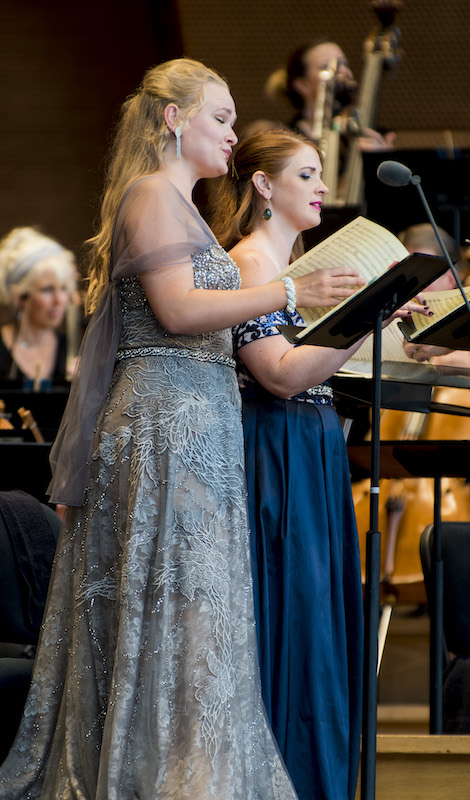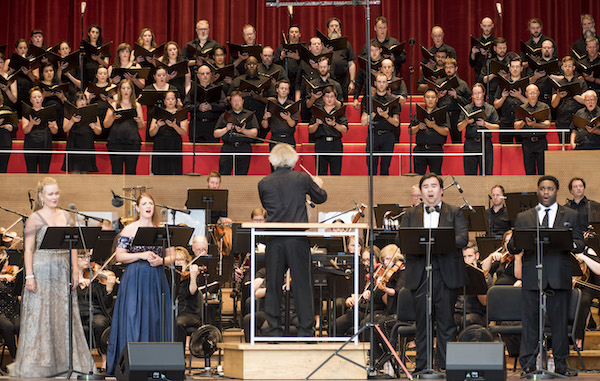Grant Park Music Festival delivers a powerful “Missa Solemnis” on another rainy night

Determined as one was to avoid writing another weather-related lede, in this rain-accursed summer at the Grant Park Music Festival, it proved unavoidable once again.
A performance of Beethoven’s epic Missa Solemnis is such a rare event that one hoped the meteorological gods would cooperate Friday night at the Pritzker Pavilion. Distant thunder initially added a nice dramatic obbligato and it seemed like the sunny skies at the park would continue.
But it was not to be. The heavens opened halfway through the Gloria and the downpour continued for much of the 78-minute performance, abating, aptly, for the concluding Agnus Dei.
Such al fresco tempests tend to affect the drenched audience members more than the artists, who are safely sheltered under the stage. Still, the distracting visuals and noise of umbrellas opening and people rushing for cover under Frank Gehry’s billowing metal sails can’t have been helpful to the performers’ concentration.
Yet even with the extracurricular distractions, Carlos Kalmar, four superb soloists, and the Grant Park Orchestra and Chorus delivered a powerful, keenly dramatic and deeply felt performance of Beethoven’s epic mass on this rainy night—one that embraced both the public and intimate qualities of this vast and extraordinary work.
As with his other large-scale vocal works (Fidelio, the Mass in C Major, Christ on the Mount of Olives), Beethoven struggled while composing his “solemn mass.” Originally intended for the installation as cardinal of his patron Archduke Rudolph, the Missa Solemnis was completed three years late. The setting grew in scale and ambition to nearly 80 minutes, with Beethoven expanding and deepening the sections to encompass his musical and religious visions.
As reflected in the Missa Solemnis, Beethoven’s intense spirituality was as much of the Enlightenment as the church—broad and humanistic, deep, often dark, yet ultimately optimistic in its view of earthly struggle and heavenly deliverance.
All that is manifest in a canvas that reflects each section’s text in striking fashion, along with an often unsettled harmonic sense and seamless balancing of large orchestra, huge double chorus and four soloists. A great Missa performance should be, in Colin Davis’ words, a “time-stopping experience.”
Friday’s performance was compelling from its very first bars—as the word “Kyrie” is sung by the entire chorus, then taken up in succeeding rising solos by the three highest solo voices. Kalmar led a performance that was strong on all levels, conveying the heaven-storming drama as surely as the moments of glowing spiritual intimacy.
The opening Kyrie was imposing and majestic, unfolding with a sense of grand inevitability with a weighty sonority of orchestra and chorus, the latter ideally blended across all sections. Taken at a fleet tempo, the frenzied exuberance of the Gloria was exhilarating, thrilling in the fugal coda, with lovely singing by the quartet in the slower, contrasting sections.
The choral singing was equally vigorous in the Credo but here again it was the solo singing that proved most affecting in this affirmation of faith. Concertmaster Jeremy Black’s luminous violin in the Benedictus contributed a chamber-like delicacy, both in his violin solos and interaction with the soloists.
An uncommonly well-balanced quartet had much to do with the evening’s success. Maeve Höglund’s soprano was a pleasure throughout—easily flexible throughout her range, rich of tone and soaring over the ensemble. Mezzo Siena Licht Miller’s secure vocalism and dusky tone contributed apt drama to the Agnus Dei.
One early entrance apart, tenor John Matthew Myers displayed a heroic timbre and ardent singing. Michael Sumuel’s rich and rounded bass-baritone anchored the quartet superbly, etching a dark and somber note at the opening of the Agnus Dei.
The only real blot on the performance wasn’t the weather, but the souped-up amplification. The fierce volume and piercing high frequencies led to some painful tuttis in climaxes. Belated knob-twiddling seemed to draw down the gain halfway through to less wince-inducing levels. Mercifully, Saturday night’s repeat is indoors and unplugged at the Harris Theater where neither weather nor electronics can do any damage.
The contributions of the Grant Park Chorus were on their usual exalted level, delivering the surging drama as surely as the mysticism and spiritual intimacy, under Christopher Bell’s direction. The playing of the Grant Park Orchestra was on the same high level, both polished and virtusoic throughout.
Friday’s performance was dedicated to the memory of Liz Gottlieb, a teacher and longtime member of the Grant Park Chorus.
Beethoven’s Missa Solemnis will be repeated 7:30 p.m. Saturday at the Harris Theater. grantparkmusicfestival.com
Posted in Performances





